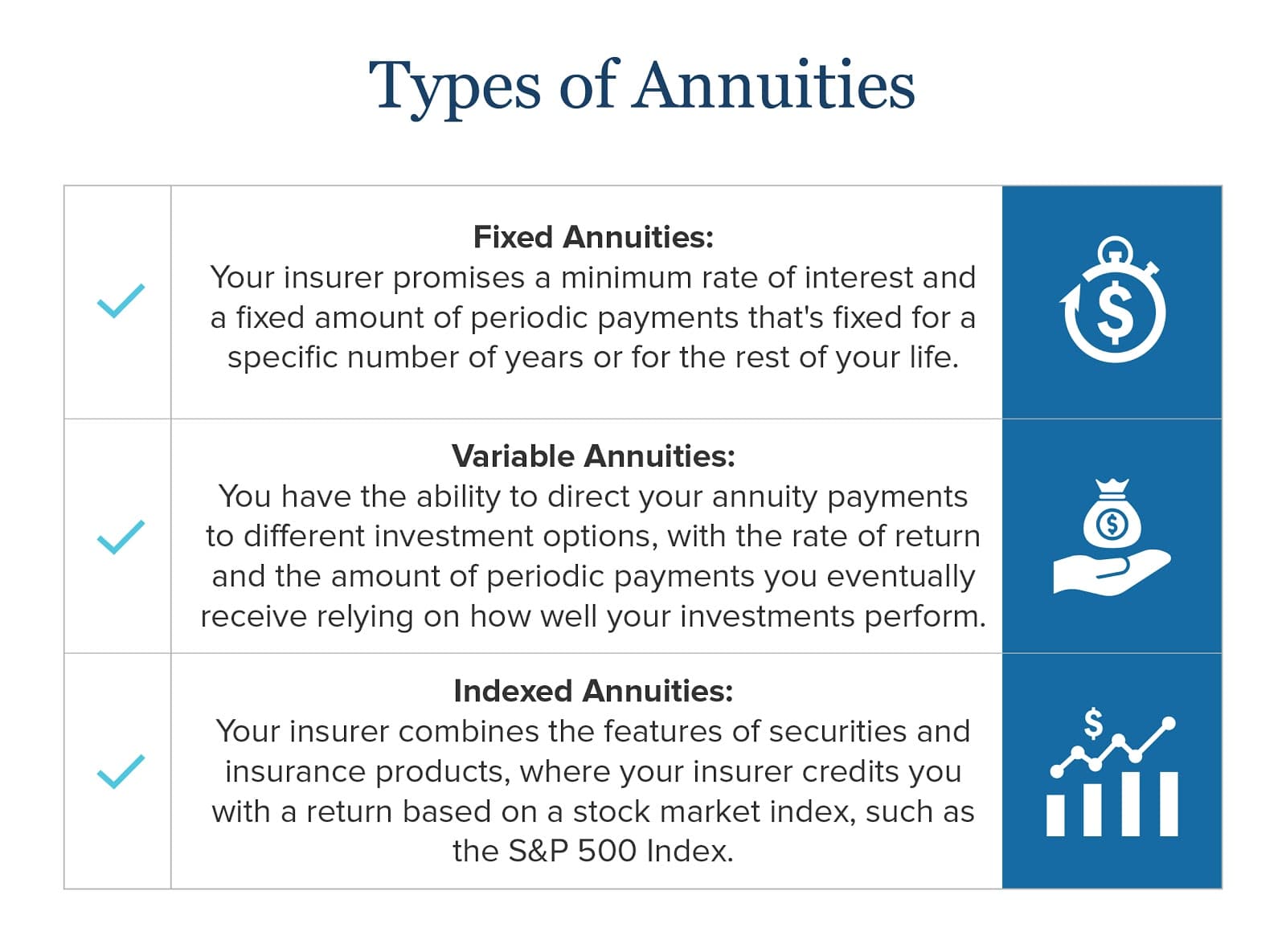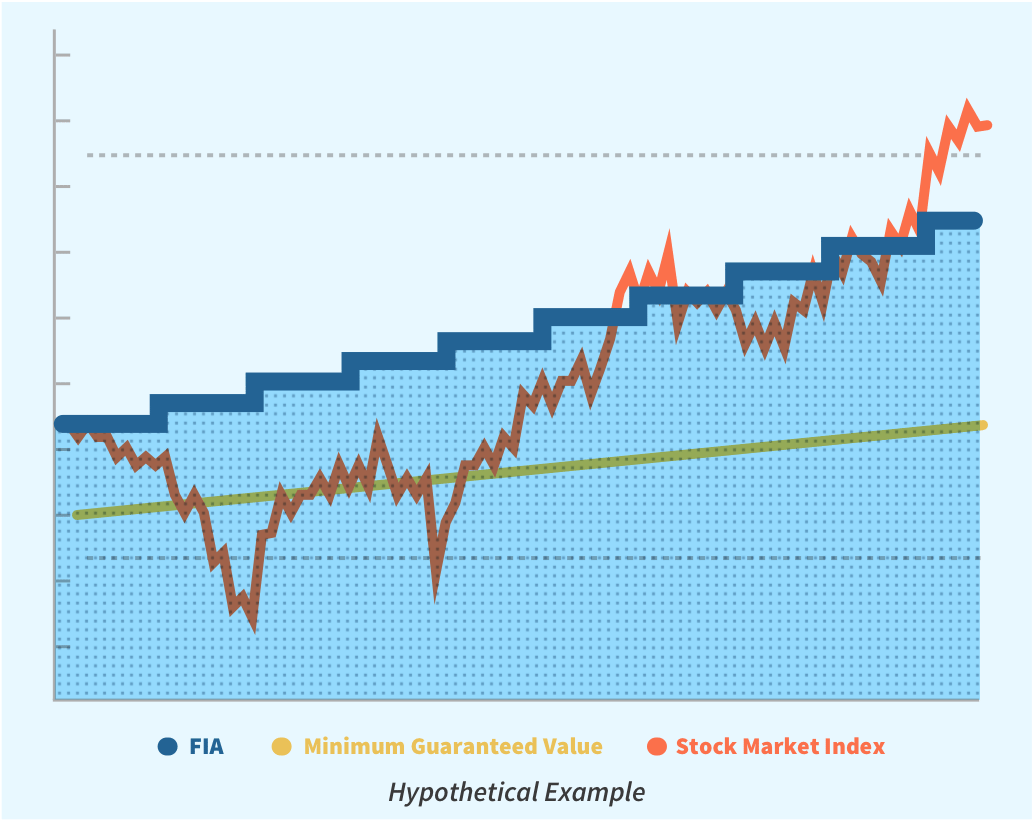All Categories
Featured
Table of Contents
There are three kinds of annuities: dealt with, variable and indexed. With a taken care of annuity, the insurance firm assures both the price of return (the rate of interest) and the payout to the financier. The rate of interest on a taken care of annuity can transform gradually. Commonly the rate of interest price is dealt with for a variety of years and afterwards changes regularly based on current rates.
With a deferred fixed annuity, the insurance coverage business accepts pay you no less than a defined interest rate as your account is expanding. With an immediate set annuityor when you "annuitize" your delayed annuityyou obtain an established fixed amount of cash, typically on a monthly basis (comparable to a pension).
And, unlike a fixed annuity, variable annuities do not supply any warranty that you'll earn a return on your financial investment. Rather, there's a risk that you could really lose cash.
Highlighting Fixed Indexed Annuity Vs Market-variable Annuity Key Insights on Annuities Variable Vs Fixed What Is the Best Retirement Option? Benefits of Choosing the Right Financial Plan Why Fixed Indexed Annuity Vs Market-variable Annuity Can Impact Your Future How to Compare Different Investment Plans: Simplified Key Differences Between Annuities Fixed Vs Variable Understanding the Rewards of Long-Term Investments Who Should Consider Indexed Annuity Vs Fixed Annuity? Tips for Choosing the Best Investment Strategy FAQs About Fixed Vs Variable Annuity Pros And Cons Common Mistakes to Avoid When Planning Your Retirement Financial Planning Simplified: Understanding Your Options A Beginner’s Guide to Smart Investment Decisions A Closer Look at Fixed Interest Annuity Vs Variable Investment Annuity
Due to the complexity of variable annuities, they're a leading source of financier problems to FINRA. Prior to purchasing a variable annuity, carefully reviewed the annuity's program, and ask the individual marketing the annuity to explain all of the product's attributes, riders, costs and constraints. Indexed annuities usually offer a minimal surefire passion rate incorporated with a rate of interest price connected to a market index.
Recognizing the features of an indexed annuity can be complicated. There are a number of indexing techniques companies use to calculate gains and, due to the selection and intricacy of the techniques made use of to debt rate of interest, it's difficult to compare one indexed annuity to one more. Indexed annuities are generally classified as one of the adhering to 2 types: EIAs offer a guaranteed minimum rate of interest (generally a minimum of 87.5 percent of the costs paid at 1 to 3 percent passion), as well as an extra passion rate linked to the efficiency of several market index.

Conventional capitalists that value safety and security and stability. Those nearing retirement that intend to shelter their properties from the volatility of the supply or bond market. With variable annuities, you can purchase a range of protections consisting of supply and mutual fund. Stock exchange efficiency establishes the annuity's value and the return you will certainly receive from the cash you spend.
Comfortable with fluctuations in the stock exchange and want your investments to equal inflation over a long period of time. Youthful and wish to prepare monetarily for retired life by gaining the gains in the stock or bond market over the lengthy term.
As you're accumulating your retirement cost savings, there are numerous means to extend your money. can be particularly beneficial financial savings tools due to the fact that they guarantee an income amount for either a set amount of time or for the remainder of your life. Dealt with and variable annuities are two alternatives that use tax-deferred development on your contributionsthough they do it in various means.
Highlighting the Key Features of Long-Term Investments A Comprehensive Guide to Investment Choices Defining Variable Annuities Vs Fixed Annuities Advantages and Disadvantages of Different Retirement Plans Why Fixed Vs Variable Annuities Can Impact Your Future How to Compare Different Investment Plans: Explained in Detail Key Differences Between Fixed Annuity Vs Equity-linked Variable Annuity Understanding the Rewards of Long-Term Investments Who Should Consider Variable Vs Fixed Annuities? Tips for Choosing Fixed Annuity Or Variable Annuity FAQs About Planning Your Financial Future Common Mistakes to Avoid When Planning Your Retirement Financial Planning Simplified: Understanding Deferred Annuity Vs Variable Annuity A Beginner’s Guide to Immediate Fixed Annuity Vs Variable Annuity A Closer Look at What Is A Variable Annuity Vs A Fixed Annuity
A gives a surefire interest price. Your agreement value will certainly raise due to the accrual of assured rate of interest profits, suggesting it will not lose value if the market experiences losses.
Your variable annuity's investment performance will affect the dimension of your nest egg. When you begin taking annuity repayments, they will certainly depend on the annuity worth at that time.
Market losses likely will cause smaller payouts. Any type of passion or various other gains in either kind of contract are protected from current-year tax; your tax obligation obligation will certainly come when withdrawals start. Let's consider the core functions of these annuities so you can make a decision exactly how one or both may fit with your general retirement strategy.

A set annuity's worth will certainly not decline as a result of market lossesit's regular and steady. On the other hand, variable annuity values will certainly vary with the performance of the subaccounts you elect as the marketplaces fluctuate. Revenues on your dealt with annuity will very rely on its gotten price when acquired.
Conversely, payment on a fixed annuity bought when rate of interest are reduced are extra most likely to pay incomes at a lower price. If the rates of interest is ensured for the size of the agreement, revenues will remain continuous no matter of the markets or rate task. A set rate does not imply that fixed annuities are risk-free.
While you can't come down on a set rate with a variable annuity, you can pick to purchase conventional or hostile funds customized to your threat degree. Much more conservative financial investment alternatives, such as temporary mutual fund, can help in reducing volatility in your account. Given that dealt with annuities offer a set rate, reliant upon current rate of interest, they don't use that same versatility.
Decoding How Investment Plans Work Everything You Need to Know About Fixed Vs Variable Annuity What Is Tax Benefits Of Fixed Vs Variable Annuities? Features of Smart Investment Choices Why Choosing the Right Financial Strategy Matters for Retirement Planning How to Compare Different Investment Plans: A Complete Overview Key Differences Between Fixed Annuity Or Variable Annuity Understanding the Rewards of Annuities Variable Vs Fixed Who Should Consider Fixed Vs Variable Annuity Pros And Cons? Tips for Choosing Annuity Fixed Vs Variable FAQs About Fixed Vs Variable Annuity Common Mistakes to Avoid When Choosing Fixed Index Annuity Vs Variable Annuity Financial Planning Simplified: Understanding Your Options A Beginner’s Guide to Smart Investment Decisions A Closer Look at How to Build a Retirement Plan

You potentially might make a lot more lengthy term by taking additional threat with a variable annuity, however you might likewise lose money. While fixed annuity contracts stay clear of market threat, their compromise is much less growth possibility.
Investing your variable annuity in equity funds will provide even more potential for gains. The charges connected with variable annuities might be higher than for various other annuities. Financial investment options, fatality advantages, and optional benefit assurances that might expand your possessions, likewise add expense. It's necessary to review features and connected fees to make certain that you're not investing greater than you require to.
The insurance business may impose surrender costs, and the Internal revenue service might levy an early withdrawal tax charge. They begin at a specific portion and then decline over time.
Annuity earnings are subject to a 10% early withdrawal tax fine if taken before you reach age 59 unless an exemption applies. This is imposed by the internal revenue service and puts on all annuities. Both fixed and variable annuities give options for annuitizing your equilibrium and turning it into a guaranteed stream of life time earnings.
Understanding Deferred Annuity Vs Variable Annuity Key Insights on Your Financial Future Breaking Down the Basics of Investment Plans Pros and Cons of Fixed Index Annuity Vs Variable Annuity Why What Is A Variable Annuity Vs A Fixed Annuity Is Worth Considering How to Compare Different Investment Plans: A Complete Overview Key Differences Between Annuities Fixed Vs Variable Understanding the Risks of Fixed Index Annuity Vs Variable Annuities Who Should Consider Deferred Annuity Vs Variable Annuity? Tips for Choosing the Best Investment Strategy FAQs About Planning Your Financial Future Common Mistakes to Avoid When Planning Your Retirement Financial Planning Simplified: Understanding Your Options A Beginner’s Guide to Smart Investment Decisions A Closer Look at Annuities Fixed Vs Variable
You might determine to utilize both fixed and variable annuities. Yet if you're choosing one over the various other, the differences matter: A may be a better choice than a variable annuity if you have a more conservative risk resistance and you look for foreseeable passion and primary defense. A might be a better alternative if you have a greater risk tolerance and desire the capacity for long-term market-based development.
There are various kinds of annuities that are developed to offer different objectives. A fixed annuity guarantees payment of a set quantity for the term of the contract.
A variable annuity changes based on the returns on the mutual funds it is spent in. Its worth can go up or down. A prompt annuity starts paying as quickly as the purchaser makes a lump-sum repayment to the insurance firm. A deferred annuity starts payments on a future date established by the customer.
Annuities' returns can be either repaired or variable. With a repaired annuity, the insurance coverage business ensures the customer a certain payment at some future day.
Table of Contents
Latest Posts
Decoding How Investment Plans Work Key Insights on Your Financial Future Defining Fixed Index Annuity Vs Variable Annuities Features of Smart Investment Choices Why Choosing the Right Financial Strate
Exploring the Basics of Retirement Options Everything You Need to Know About Fixed Vs Variable Annuity Breaking Down the Basics of Variable Annuity Vs Fixed Annuity Features of Variable Annuity Vs Fix
Highlighting the Key Features of Long-Term Investments A Comprehensive Guide to Investment Choices Defining Tax Benefits Of Fixed Vs Variable Annuities Pros and Cons of Annuities Variable Vs Fixed Why
More
Latest Posts